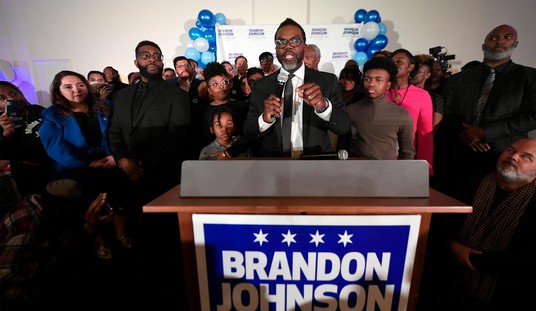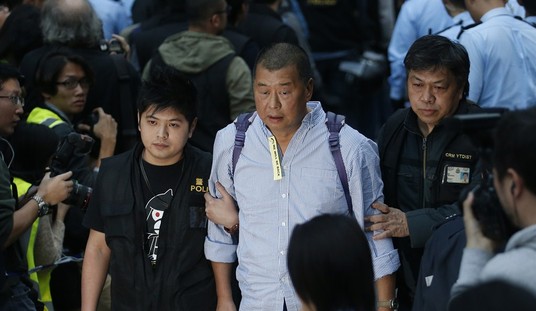As the situation in the Crimean Peninsula continues to deteriorate, there has been plenty of time for analysts to try to sort out where this show is heading, what the long term implications are and – perhaps more importantly – what the rest of the world can, or should, do about it. It’s not difficult to conclude that Russia is clearly “on the wrong side of history” (to borrow a phrase from the President) and something needs to be done. But what?
There are a couple of very interesting articles on this subject offering a rather counter-intuitive answer from Dr. James Joyner this week. Joyner’s profession and background is such that he pretty much eats, sleeps and breaths foreign policy, so I was interested in finding out what he had to say on this admittedly complicated situation. In the first piece, he looks at the technical details of the Budapest Memorandum, (a subject which Ed covered here when this first broke open) and finds that it might not say what many of us think it says. Russia is clearly in violation, but the response required by the West has some caveats.
While Russia is almost certainly in violation of both the spirit and letter of The Budapest Memorandums on Security Assurances of 1994, the other signatories have no obligation whatsoever to do anything about it…
Likewise, the parties “reaffirm their commitment to seek immediate United Nations Security Council action to provide assistance to Ukraine, as a non-nuclear-weapon State party to the Treaty on the Non-Proliferation of Nuclear Weapons, if Ukraine should become a victim of an act of aggression or an object of a threat of aggression in which nuclear weapons are used.” Emphasis mine. So, unless Russia uses nuclear weapons, the other signatories have no obligation to do anything. If Russia were, unfathomably, to threaten or use nukes, then the other parties would be obligated to take the matter to the Security Council—where Russia would promptly veto any proposed action.
In terms of following the precise constraints of the agreement, I’ll grant that Joyner is correct. (And the odds of Russia breaking out any nukes over this seem miniscule indeed.) But at the same time, that’s a rather “lawyerly” way of looking at it, much the same as a company seeking any hidden clause in the user agreement to avoid making good on a warranty. As Joyner himself concedes, Russia has at least violated the spirit of the agreement, and likewise, the spirit of the memorandum would imply that the West will have Ukraine’s back in a case like this.
Putting the legal details aside, though, how actively engaged – particularly if it comes to military action – should the West be in keeping the Ukraine in one piece? For a different perspective on this question, Joyner refers to an analysis from Anatol Lieven
In the two decades after the collapse of the USSR, it should have become obvious that neither West nor Russia had reliable allies in Ukraine. As the demonstrations in Kiev have amply demonstrated, the “pro-Western” camp in Ukraine contains many ultra-nationalists and even neo-fascists who detest Western democracy and modern Western culture. As for Russia’s allies from the former Soviet establishment, they have extracted as much financial aid from Russia as possible, diverted most of it into their own pockets, and done as little for Russia in return as they possibly could.
Over the past year, both Russia and the European Union tried to force Ukraine to make a clear choice between them—and the entirely predictable result has been to tear the country apart. Russia attempted to draw Ukraine into the Eurasian Customs Union by offering a massive financial bailout and heavily subsidized gas supplies. The European Union then tried to block this by offering an association agreement, though (initially) with no major financial aid attached. Neither Russia nor the EU made any serious effort to talk to each other about whether a compromise might be reached that would allow Ukraine somehow to combine the two agreements, to avoid having to choose sides.
For now, the overwhelming need is to prevent war. War in Ukraine would be an economic, political, and cultural catastrophe for Russia. In many ways, the country would never recover, but Russia would win the war itself. As it proved in August 2008, if Russia sees its vital interests in the former USSR as under attack, Russia will fight. NATO will not. War in Ukraine would therefore also be a shattering blow to the prestige of NATO and the European Union from which these organizations might never recover either.
Joyner’s response seems to be that a full blown war of any description would be a disaster, but he differs with Lieven on the end game.
Now, I concur in Lieven’s bottom line view that major war in Ukraine would be a disaster and should therefore be avoided. It’s not at all clear to me that a unified Ukraine is particularly desirable, much less fighting for. As Dave Schuler note over the weekend (see “The Ukraine Crisis in Three Maps” and “More Ukrainian Maps“) how to split Ukraine is by no means obvious. But Lieven hardly overstates the situation when he declares “If there is one absolutely undeniable fact about Ukraine, which screams from every election and every opinion poll since its independence two decades ago, it is that the country’s population is deeply divided between pro-Russian and pro-Western sentiments.”
But Lieven’s contention that failure to fight a war that Lieven describes as catastrophic would somehow be the death knell to NATO and the EU is a head scratcher. First, avoiding disasters would seem an unalloyed good. Second, aside from some counter-piracy operations, the EU has no history of operating as a military entity. Third, Ukraine rejected entreaties to join both NATO and the EU; in what universe are NATO and the EU nonetheless obligated to go to war to defend Ukraine?
Joyner put a sub-topic on the second article which says, literally, “The West owes Ukraine nothing.” But I’m not reading that from the conclusions. After digesting all of this, I can see where a case can be made that the Ukraine – speaking strictly as a national government entity – hasn’t exactly gone above and beyond to endear itself to the West, and has snubbed some opportunities to align more closely with European interests. It’s also clear that the country is divided, and deciding who, precisely, is speaking for the people at any given time isn’t a job for the layman. But at the same time, it’s not hard to understand that Ukrainians are under a lot of pressure, living with the Russian Bear literally on their doorstep. It’s also impossible to ignore the fact that there is an element of unrest there expressing a desire for independence and a chance to chart their own course – something the US should, by definition, support.
But does that obligation of support extend to the level of an end game where Western troops are exchanging fire with the Russians at some point? Like both Joyner and Lieven, I think we should all hope that another solution presents itself long before things reach that stage, and there are many possibilities of that happening. The real question for us now is whether or not we have a policy in place – not to mention a plan – if all those other measure fail.








Join the conversation as a VIP Member